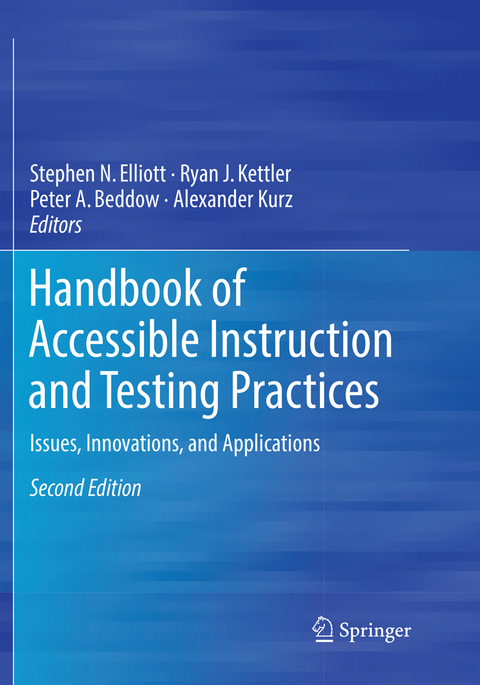
Handbook of Accessible Instruction and Testing Practices
Springer International Publishing (Verlag)
978-3-030-10017-9 (ISBN)
The Second Edition of this handbook provides comprehensive coverage of the concept of accessibility and its application to the design and implementation of instruction and tests with all students. It updates and expands on its original contents and responds to the increasing demand for research-based evidence of accessible instruction and testing practices from the professional community. Chapters explore how outcomes are affected when essential features or components of instructional materials and tests are not accessible to any portion of the student population. The handbook addresses the new set of Standards for Educational and Psychological Testing that was published in 2014 as well as requirements for a high level of access for all interim and summative tests by national testing consortiums. In addition, the handbook describes how the Center for Applied Special Technology (CAST) has continued to advance Universal Design for Learning (UDL) principles in mainstream education with teachers of all types of students, not just students with disabilities.
Topics featured in this text include:
- A summary of U.S. policies that support inclusive assessment for students with disabilities.
- An overview of international policies that support inclusive assessments.
- Designing, developing, and implementing an accessible computer-based national assessment system.
- Universal Design for Learning (UDL) principles and the future of assessment.
- Recent advancements in the accessibility of digitally delivered educational assessments.
Stephen N Elliott, PhD, the senior editor, is the Mickelson Foundation Professor at Arizona State University. Steve teaches courses on measurement and assessment of academic and social behavior and co-directs two USDE research grants concerning opportunity to learn and the achievement growth of students. Steve has authored more than 250 journal articles, books, and chapters as well as 6 widely used behavior-rating scales. Ryan J. Kettler, PhD, is an Associate Professor in the School Psychology Program of the Graduate School of Applied and Professional Psychology at Rutgers, The State University of New Jersey. He conducts research in data-based decision making, including issues related to screening, inclusive assessment, rating scale technology, and reliability and validity issues. Ryan has authored more than 50 articles and chapters. Peter A. Beddow, PhD, is the president of Accessible Testing, LLC, the mission of which is to facilitate the development of tests that are free from barriers for students with a broad range of abilities and needs. He is the senior author of the Test Accessibility and Modification Inventory and has authored numerous articles and chapters on accessibility theory. He also operates Accessible Behavior, LLC, through which he works with teachers, parents, and other caregivers and leaders to understand and manage child behavior and facilitate positive behavior change for individuals with behavior problems. Pete lives in Nashville, Tennessee.
Chapter 1. Introduction: Accessible Instruction and Testing Today.- Part 1. Professional Policies & Consideration.- Chapter 2. U.S. Education Policies that Support Accessible Instruction and Testing.- Chapter 3. International Policies that Support Inclusive Assessments.- Chapter 4. Fair Testing and the Role of Accessibility.- Chapter 5. The Role of Accessibility in a National Testing Program.- Chapter 6. Professional Development for Delivering on the Promise of Accessible Instruction and Testing.- Part 2. Special Populations.- Chapter 7. The Accessibility Needs of Students with Disabilities.- Chapter 8. The Accessibility Needs of English Language Learners.- Part 3. Classroom Connections.- Chapter 9. Opportunity to Learn What is Tested: What We Know Today.- Chapter 10. Response-to-Intervention Models and Access to Services for All Students.- Chapter 11. Advances in the Application of Universal Design for Learning.- Chapter 12. Academic Testing for Students with Autism and Behavior Challenges: Considerations and Recommendations.- Part 4. Test Design Principles & Innovative Practices for More Accessible Tests.- Chapter 13. Item Writing Research.- Chapter 14. Influences of Universal Design and Cognitive Load Theory on Item and Test Design.- Chapter 15. Testing Accommodations and Item Modifications: Research to Guide Practice.- Chapter 16. Advances in the Accessibility of Computer Delivered Tests.- Chapter 17. Computer-Based Test Models: Advantages, Disadvantages, and Recommendations.- Part 5. Conclusions: Accessibility Challenges, Innovative Answers.- Chapter 18. Accessible Classrooms and Tests: Essential Components to Advance Educational Equity and Quality.
| Erscheinungsdatum | 04.02.2019 |
|---|---|
| Zusatzinfo | XIII, 276 p. 26 illus., 10 illus. in color. |
| Verlagsort | Cham |
| Sprache | englisch |
| Maße | 178 x 254 mm |
| Gewicht | 559 g |
| Themenwelt | Geisteswissenschaften ► Psychologie ► Entwicklungspsychologie |
| Geisteswissenschaften ► Psychologie ► Pädagogische Psychologie | |
| Medizin / Pharmazie ► Medizinische Fachgebiete ► Psychiatrie / Psychotherapie | |
| Sozialwissenschaften ► Pädagogik ► Sozialpädagogik | |
| Schlagworte | Accessibility needs and English language learners • Accessible testing and cognitive load theory • Autism and accessible testing • Behavior challenges and accessible testing • Classroom connections and accessible instruction • Cognitive load theory and item design • Computer-delivered accessible tests • Developmental disabilities and accessible testing • Educational Equity and Quality • ELL and accessible testing • Intellectual disabilities and accessible testing • International policies and inclusive assessments • Item writing research and accessible tests • National testing program and accessibility • Professional teacher development and testing • Response-to-Intervention models and services acces • Response-to-Intervention models and services access • Special populations and accessible testing • Test design principles and accessible tests • Testing accessibility and educational policy • Universal Design for Learning (UDL) |
| ISBN-10 | 3-030-10017-0 / 3030100170 |
| ISBN-13 | 978-3-030-10017-9 / 9783030100179 |
| Zustand | Neuware |
| Informationen gemäß Produktsicherheitsverordnung (GPSR) | |
| Haben Sie eine Frage zum Produkt? |
aus dem Bereich



